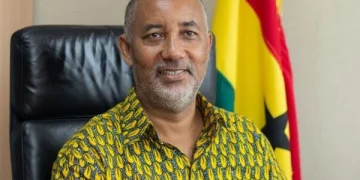Juliet Yaa Asantewaa Asante, founder of Black Star International Film Festival (BSIFF), is calling on the Ghanaian Parliament to prioritise the passage of a creative tax incentive bill that has faced significant delays.
The former Director of Ghana’s National Film Authority believes that this legislation is essential for enhancing investor confidence in Ghana’s rapidly expanding film industry.
In a recent exclusive interview with Hoenyefia Noah Nash during festivities marking the 10th anniversary of BSIFF in Accra last weekend, Asante conveyed her deep concerns about the current state of the film sector.
She pointed out that without strategic and well-defined policy measures, Ghana risks losing its potential to emerge as a competitive player on the global film stage.
“We urgently need a tax incentive,” Asante remarked, highlighting the critical nature of the issue. “Just before I left my position, we finalized a comprehensive tax incentive document that was prepared and ready to be presented to Parliament. It is imperative that we move beyond mere conversations and actually implement these changes if we genuinely wish to attract substantial investments into our film industry.”
Asante’s comments underscore the importance of proactive governmental support in fostering a vibrant filmmaking environment, which she believes will not only benefit the industry but also contribute to the overall cultural and economic development of Ghana.
A Decade of Pan-African Film Excellence
The BSIFF, established in 2015, has grown into one of Africa’s most important film platforms, connecting filmmakers, financiers, and audiences. This year’s festival showcased 27 films selected from 127 submissions across Africa and its diaspora.
Attendees included producers, students, actors, directors, and marketers from over 25 countries. A major topic during this year’s panel discussions was the representation of West Africa in African cinema, with a goal set to capture 10% of the African film market share.
 “We want to create opportunities for filmmakers to reach at least 10% of the African market,” said Asante. “It’s already happening, and partnerships like the one we’ve signed with Majestic Cinema will help us achieve that.”
“We want to create opportunities for filmmakers to reach at least 10% of the African market,” said Asante. “It’s already happening, and partnerships like the one we’ve signed with Majestic Cinema will help us achieve that.”
New Partnership to Expand Francophone-Anglophone Collaboration
During the event, the BSIFF announced a strategic partnership with Majestic Cinema, the largest cinema chain in Francophone West Africa.
The memorandum of understanding (MoU) aims to promote the cross-regional distribution of African films, especially between English-speaking and French-speaking regions.
“We have just signed with Majestic Cinema to bring Ghanaian films to French West Africa and vice versa,” said Juliet Asante, the festival director.
“They have even committed to investing in marketing and exhibition efforts.” This collaboration is expected to provide new market access for Ghanaian filmmakers and strengthen cultural ties between West and Central Africa.
“Son of the Soil” Premieres and Wins Best Film
Among the featured films was the Nigerian production “Son of the Soil,” directed by Chee Keong Cheung and starring British-Nigerian actor Razak Adoti, who attended the world premiere. “We shot the film in Africa, so it made sense to premiere it here,” Adoti remarked. “Ghana’s BSIFF provided us with a platform we couldn’t pass up. The local support during filming was incredible.”
The film won the award for Best Film, earning praise for its grassroots collaboration with local communities and impressive cinematic quality, despite economic challenges.
Local Movies Shines
Ghanaian short film “Coin Quest,” directed by a 25-year-old filmmaker from Kumasi, was highlighted by Juliet Asante as one of the standout pieces of the festival. “This is why we need investment. There’s so much raw talent in Ghana. ‘Coin Quest’ is told from the perspective of a one-peso coin—and it blew my mind,” she said.
Christiana Opoku Asiedu, co-producer of the film “Sweet Palm Wine,” echoed the call for support and funding. “We have shown that Ghana has world-class stories. Now we need the resources to scale them.”
Actor Majeed, who recently filmed in Abidjan, said the future lies in cross-border collaboration. “We need more co-productions between French and English-speaking Africa. There’s a whole untapped market out there.”
Aba Arthur, a Hollywood actor of Ghanaian descent, added: “Events like BSIFF allow us to collaborate, learn, and grow the industry together. The potential is huge.”
BSIFF Heads to Kumasi in 2026
In a bid to decentralise the festival and engage more regions, organisers announced that the next edition of BSIFF will take place in Kumasi from September 24–27, 2026. AS the 10th edition of BSIFF comes to a close, industry stakeholders are directing their attention toward Ghana’s policymakers.
The message is straightforward: pass the tax incentive bill to unlock the full potential of the creative economy. “The deals are being made. The films are here. The talent is undeniable. Now, it’s time for the government to do its part,” stated Asante.
Source: www.KumasiMail.Com/Hoenyefia Noah Nash


































































